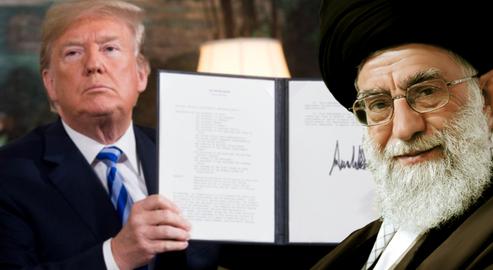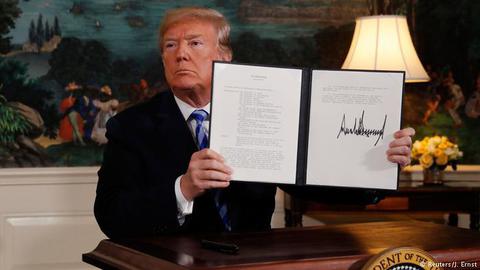Supreme Leader Ayatollah Khamenei has told the Iranian government that it must secure “strong and reliable guarantees” from the United Kingdom, France and Germany if the Islamic Republic is to remain in the nuclear deal, or the Joint Comprehensive Plan of Action (JCPOA).
Speaking on the morning of Wednesday, May 9, Khamenei gave his public response to US President Trump’s May 8 announcement that the US will withdraw from the JCPOA.
Khamenei’s response can be summed up as “heroic flexibility 2.0.” On September 17, 2013, addressing Revolutionary Guards’ commanders, he used the analogy of a wrestling match when talking about world diplomacy: “A wrestler sometimes shows technical flexibility but he never forgets who his opponent is and what his main goal is,” he said. He described this technique as “heroic flexibility,” and with it, he gave a green light to the nuclear negotiations that led to the JCPOA. Now, five years after that speech, he has again given backhanded support for efforts to preserve the nuclear deal. “if you can get guarantees [from Europeans], fine, although I doubt it,” Khamenei said. “If not, we cannot stay in the JCPOA agreement."
This response from Khamenei is noteworthy for two reasons. On June 14, 2016, in response to a threat from Trump, he said if the US tore up the deal, the Iranians would burn it. This sort of revolutionary bragging became a dominant theme in both Iranian media and diplomacy. But in his recent speech, he adopted a different tone. Instead, he bragged about Iran’s compliance with the JCPOA. “We have implemented this agreement for the past two and a half years, and now this brute says that he does not accept it," he said.
Secondly, Khamenei’s statements could potentially strengthen the hand of those who want the JCPOA to survive, but know that Iran needs European guarantees to succeed. In recent days, President Rouhani has talked about working with Europeans to save the nuclear deal. But on May 8, Ali Shamkhani, the secretary of Iran’s Supreme National Security Council, warned Europeans not to offer a helping hand to Trump by trying to “get more concessions from the Islamic Republic of Iran through the JCPOA” — because they would end up destroying the nuclear deal. And on May 9, General Mohammad Ali Jafari, the commander of the Revolutionary Guards, celebrated the US withdrawal from the JCPOA, adding: “It is obvious that Europeans cannot decide independently between the US and Iran because they are dependent on America.”
Negotiate — for Now
These statements show that senior officials of the Islamic Republic are not in agreement when it comes to how to deal with the European countries in the deal. And although Khamenei announced on May 9 that he does not trust the three European countries, he generally agrees with Rouhani’s government on the need for negotiations with them — for the moment, at least.
“Guarantees” and “concessions” are likely to become hot topics for argument and discussion in Iran in the coming days. The Supreme Leader and those who support his speech this week will demand practical and ironbound guarantees from the Europeans — the British, the Germans, and the French — so that the JCPOA can survive. But by listening to European officials, it is clear that some “concessions” by Iran will definitely be required. However, until it is clear exactly what those concessions are, it is difficult to know how flexible the Islamic Republic is willing to be to save the JCPOA.
The Supreme Leader’s quick response to the US will likely be the basis for coordinating Iran’s approach to the international community and to the new situation, but it will not prevent domestic criticisms and squabbling. Khamenei himself hedged his bets, reminding his listeners that he had been right all along to be concerned about the JCPOA. “You can see for yourselves that my prediction is now a reality,” he said. “We agreed on the nuclear agreement — but the animosities against Iran did not cease.”
This statement will provide a good excuse for principlist conservative opponents of President Rouhani to admonish him for ignoring Khamenei’s advice during nuclear negotiations. The first sign of the coming admonishments emerged as early as May 9, a day after Trump’s announcement, when Ayatollah Ahmad Jannati, the head of the Guardian Council, said: “This breach of promise by the US proves that [Khamenei’s] view was more accurate than those of others, and that he understands politics better than anybody else.”
More on Trump’s withdrawal from the nuclear treaty with Iran:
What are Iran’s Choices as US Abandons the Nuclear Deal?, May 9, 2018
What you Need to Know About Trump and the Nuclear Deal, May 8, 2018
visit the accountability section
In this section of Iran Wire, you can contact the officials and launch your campaign for various problems


























comments